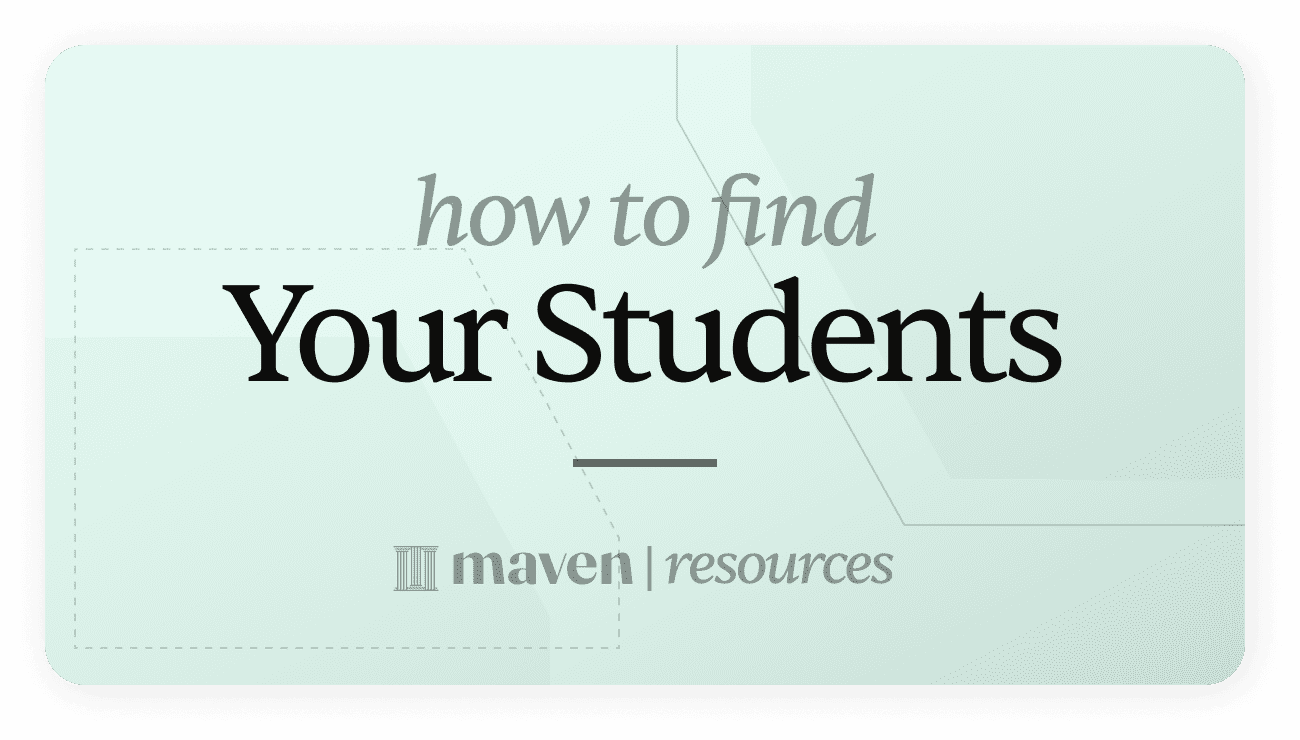How to find students within your network
By Claire Chen
Instructor Partnerships

Summary
As you start thinking about building a course, you'll reach out to your existing network to get referrals. We've got a tool and a template for reaching out to your contacts.
You have valuable knowledge to share and prospective students are eager to benefit from your expertise. Now the question is: How do you find students for your course?
The best place to start is within your existing network. Why? First, it’s much easier to reach out to people you’re familiar with than it is to ping strangers. Second, these people already trust you and know your work to some degree, so it’s easier to show your value. Third, each person in your network is connected to hundreds–if not thousands–of prospective students.
Who should you reach out to?
The goal here is to create an email list of folks you can reach out to. Aim for 50 people to start, but once you get going, you may find that your list grows to 100+ people pretty easily.
As you’re building this list, some good guiding questions are:
Who in your network might benefit from your course? Who would know someone who could benefit from your course?
How to export your contacts
Hear from our CEO, Gagan Biyani, on how to export your contacts list and start your course outreach.
Here are some additional categories to help you brainstorm:
- Family members
- Friends from college
- Former coworkers or direct reports from each company you worked at
- Former and current clients
- Mentors or mentees
- Organizations or industry groups you’re a part of
- Online communities you’re a part of
Most friends/colleagues will be glad (or neutral) to hear from you, so don’t feel self-conscious about reaching out. Be liberal and inclusive with the names you add to your list.
What should you say?
Your message should make it easy for your network to do two things:
- Think of people who might benefit from your course
- Forward your note to those people
It should include a brief overview of who you are and what your course is about, and a clear ask: “Can you forward this to anyone you think would benefit from this program?” This framing is important: instead of asking them to market your course on your behalf, you’re giving them a chance to add value to their network by sharing a relevant course.
Here’s a checklist of questions your note should cover:
- What is your course called and who is the target student?
- What’s the value-add of your course? What outcome can students expect to achieve?
- What expertise do you have that makes you the best person to teach this course?
- What is your “ask” to your network? What action do you want people to take?
🔖 Here’s an outreach template:
Hi ____,
Hope you’re well! I’m reaching out because I recently launched a new course and wanted to see if you’d be up for sharing it with folks who would find it valuable. The course is called [course name] for [target student].
This course is for non-technical professionals looking to break into a role at a high-growth startup. We’ll cover topics like structuring your resume, nailing the interview process, and acing your first 90 days on the job. These are the frameworks I developed over more than a decade running teams at startups and that I wish I had access to earlier in my career. I’ve already coached hundreds of professionals to find jobs at Google, Amazon, Airbnb, and many top-level venture-backed startups. Now I’m looking to share this knowledge with a wider audience.
If you know folks who could benefit from this course, please forward this note. Or they can email me directly at instructorname@gmail.com and I’m happy to share more. Thank you for your help!
The above is an email template, but you can reach out via text or DM too. If you do text or DM, shorten the note by a lot–it’ll look more casual and personal, and be easier to read on the narrower form factor of a phone.
How to follow up
Once you’ve sent out your messages, make sure to follow up with anyone who’s interested. If you don’t get a reply, follow up after 3-5 days to give a gentle nudge. Most people are busy and appreciate a bump. After 3 bumps, you can assume they’re not interested at the moment and that’s totally okay.
Related Courses
Level up on Linkedin Accelerator
Build confidence, overcome “cringe,” and use LinkedIn as a powerful career growth tool.
Early-stage prospecting and pipeline building
Build a warm outreach motion to connect with prospects who are likely to buy from you.
From Invisible to In-Demand: LinkedIn for Engineers
Get recognized, build credibility, and attract opportunities — without cringe self-promotion or a FAANG job — in just 30 minutes a day.
Build a Lean MVP for your startup in under USD 22K using GenAI
Leverage GenAI to fulfil your startup dream by learning to validate your idea, translate idea to MVP & find right partners for your startup